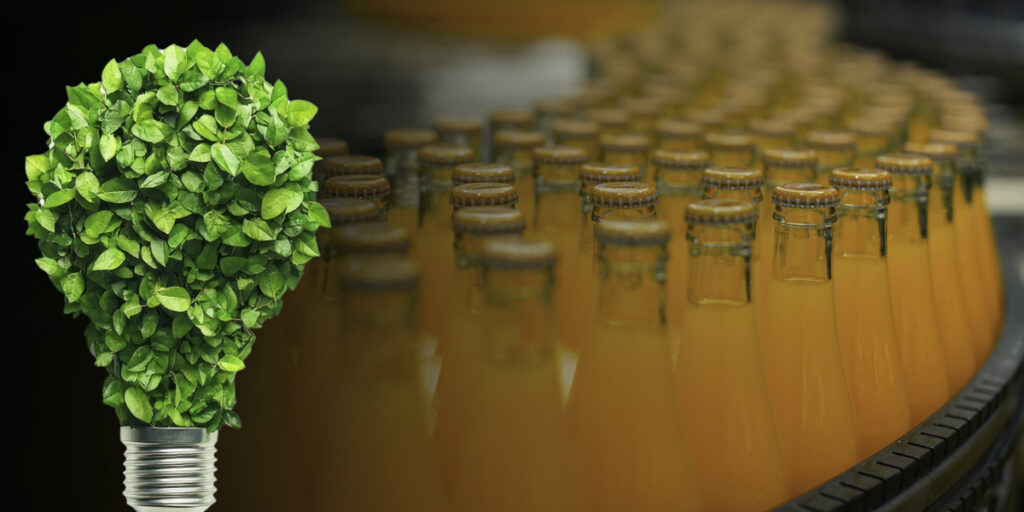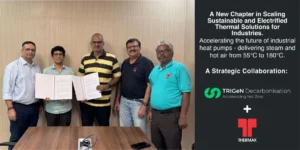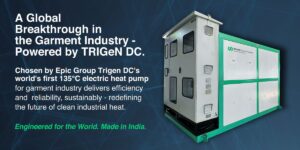Decarbonization in the Food Processing Industry: Opportunities and Innovations
The world is witnessing an unprecedented push towards decarbonisation, and the food processing industry finds itself at the centre of this transformation. As nations commit to achieving net-zero emissions by 2050.
Now every sector must play its part in reducing greenhouse gas emissions. The food industry, being one of the largest contributors to global carbon emissions, faces both immense responsibility and significant opportunities.
According to recent studies, the global food system contributes approximately 26% of total greenhouse gas emissions, with food processing and manufacturing accounting for a substantial portion.
In India, where food processing contributes over 11% to GDP and employs millions, the urgency for sustainable practices has never been greater.
The challenge is compelling yet complex. We need to ensure food security for a growing population expected to reach 9.7 billion by 2050, while dramatically reducing the carbon footprint of how we produce, process, and distribute food. The good news? The food processing industry has numerous opportunities to reduce emissions while maintaining efficiency and profitability. From renewable energy integration to smart manufacturing technologies, the pathway to decarbonization is filled with innovative solutions.
Understanding the Carbon Footprint of the Food Processing Sector
To effectively address decarbonization, we must first understand where emissions originate across the entire lifecycle. The carbon footprint extends far beyond factory walls, encompassing raw material sourcing to final packaged products reaching consumers.
Energy Consumption Patterns
Food processing facilities are among the most energy-intensive industrial operations. Boilers used for steam generation often run on fossil fuels, contributing directly to carbon emissions.
Industrial chillers and refrigeration systems consume substantial electricity, particularly in dairy processing, frozen food manufacturing, and cold storage. Conveyor systems, packaging machines, and automated equipment add to overall energy demand.
Thermal energy requirements are particularly significant. Many operations require precise temperature control – pasteurisation in dairy plants, baking in confectionery, or sterilisation in canned food production. These processes traditionally rely on natural gas or coal-fired boilers, making them prime targets for decarbonisation.
Packaging and Indirect Sources
Packaging represents another major emission source. Production of plastic films, aluminum cans, glass bottles, and cardboard requires energy-intensive manufacturing.
Transportation of finished products, especially temperature-controlled items, adds to the carbon footprint. Water usage for cleaning, cooking, and sanitation contributes indirect emissions through treatment, heating, and wastewater management.
Why Decarbonisation Matters in Food Processing
The imperative extends beyond environmental responsibility, encompassing regulatory compliance, economic benefits, consumer expectations, and business sustainability.
Regulatory Pressures
India’s commitment to net-zero emissions by 2070 has created increasingly stringent regulations. SEBI’s mandatory ESG reporting for top listed companies makes carbon footprint disclosure compulsory.
The EU’s Carbon Border Adjustment Mechanism impacts Indian food exporters by imposing carbon costs on imports, making decarbonisation economically necessary for export-oriented companies.
Consumer Demand and Market Benefits
Today’s consumers, particularly millennials and Gen Z, actively seek environmentally responsible brands. Recent surveys indicate 73% of Indian consumers are willing to pay more for products from environment friendly companies. This shift drives competitive advantages for companies show genuine sustainability commitment.
Economic Benefits
While initial investments may seem substantial, long-term economic benefits are compelling. Energy-efficient equipment reduces operational costs significantly. Heat recovery systems can reduce energy consumption by 20-30%, translating to substantial savings.
Renewable energy integration offers predictable costs and protection against volatile fossil fuel prices, with many Indian food companies reporting 30-40% electricity cost reductions after solar installations.
Key Opportunities for Decarbonisation
Energy Efficiency Upgrades
Energy efficiency represents the most immediate and cost-effective decarbonisation approach. Heat recovery systems capture waste heat from cooking, pasteurization, and sterilization for reuse, reducing energy consumption by 15-25%. Advanced insulation in equipment and piping prevents heat loss, while motor optimisation through variable frequency drives can reduce electricity consumption by 15-20%.
Heat Pumps
Deployment of Energy Efficient heat pumps can bring down the Process Energy Consumption by as high as 40-60% and coupled with the heat recovery systems the fuel cost savings of 70-80% can be achieved. Low-GWP refrigerants such as HFO, CO2, and natural alternatives can replace traditional synthetic refrigerants, dramatically reducing indirect emissions.
Renewable Energy Integration
Solar thermal systems are well-suited for food processing applications requiring hot water or steam at moderate temperatures. Combined with thermal storage, solar thermal provides a consistent heat supply for pasteurisation and cleaning operations.
Biogas from organic waste presents circular economy opportunities where food processing waste becomes an energy source through anaerobic digestion, generating on-site electricity or direct heating.
Green Packaging and Water Management
Biodegradable films from plant-based materials and recyclable packaging designs reduce lifecycle emissions. Water recycling systems coupled with Heat Pumps can reduce fresh water consumption by 60-80%, while Zero-Liquid Discharge systems eliminate wastewater discharge and recover resources for reuse.
Innovations Driving Low-Carbon Transformation
AI and IoT for Smart Energy Management
Artificial Intelligence and IoT technologies revolutionise energy management through real-time energy monitoring and predictive maintenance. Smart systems identify inefficiencies, predict equipment failures, and optimize energy use automatically, reducing consumption by 10-15% while improving equipment effectiveness.
Electrification of Thermal Processes
Electric ovens and heat pumps are replacing gas-fired equipment, offering precise temperature control and the ability to utilise renewable electricity. Heat pumps provide 300-400% efficiency compared to direct electric heating.
Induction heating reduces energy consumption by 30-50% while providing superior process control.
Emerging Technologies
Carbon capture and utilization from fermentation processes in breweries and bakeries recovers CO2 for packaging or other applications. Blockchain technology enables transparent supply chain emissions tracking, allowing accurate carbon footprint measurement and consumer transparency.
The Hidden Powerhouse: Heat Pumps Revolutionising F&B Operations
Heat pumps are rapidly emerging as a game-changer in the decarbonisation of food processing. Unlike traditional boilers or electrical heaters, modern industrial heat pumps:
- Simultaneously Provide High and Medium-Temperature Heating: Today’s advanced heat pumps can deliver hot water and process steam up to 140°C, meeting critical demands in dairy pasteurisation, beverage production, baking, canning, and ready-to-eat meals.
- Offer Free-of-Cost Cooling: A unique advantage—every unit of heat generated comes with a proportional amount of cooling, which can be channeled into cold storage, fermentation rooms, or process water pre-cooling—without additional energy expenditure.
- Slash Operating Expenses: By leveraging heat recovery from waste streams and integrating with renewable sources like solar thermal panels (input temperatures of 60°C+), heat pumps can achieve energy cost reductions of 40–60% compared to conventional systems.
- Cut Carbon Emissions, Enhance ESG Performance: Electrified, grid-connected or renewably powered heat pumps enable manufacturers to decouple their thermal processes from fossil fuels—directly reducing Scope 1 and Scope 2 emissions and supporting regulatory compliance.
Precision, Safety, and Automation: Advanced control systems ensure exact temperature control, resulting in higher product consistency and quality, as well as improved worker safety due to the elimination of high-pressure steam systems.
A Real-World Example: How a Leading Dairy Slashed Carbon—and Costs—Using Heat Pumps and Solar PV - Mini Dairy
Consider the journey of an innovative Indian dairy that faced steep fuel bills and tightening ESG regulations. Instead of relying solely on fossil-fuel boilers, the cooperative installed a hybrid system:
- Industrial Heat Pump (integrated into the pasteurisation loop) efficiently lifts water to process-required temperatures of 90–110°C, while simultaneously supplying chilled water at 5°C for milk storage and fermentation.
- The Heat Pump & The Cooling systems are run on Solar PV during the day and supported by BESS for operations during the Non- Solar Hours
- Results Achieved:
- Grid electricity usage cut by 55% and fossil fuel usage by 70%
- Annual operating savings of ₹1.5 crores
- 4,250 tonnes of CO₂ emissions avoided per year
- Payback in just under One and Half years
Multiple Benefits, One Smart Move
What distinguishes this approach is not just reducing emissions—it’s transforming plant economics and resilience:
- Lower energy costs protect profits and price competitiveness.
- “Free” cooling slashes chiller loads, serving F&B operations needing simultaneous hot/cold utilities (e.g., breweries, bakeries, dairy, frozen foods).
- Qualifies for ESG-linked financing, Green Credits, and positive brand impact with customers and export markets.
Policy and Funding Support
Government Initiatives
The PMFME scheme provides 35% credit-linked subsidies for clean technology adoption. PLI scheme for food processing includes sustainability criteria with up to 10% incentives for meeting sustainability targets. State programs like Gujarat’s Green Energy Corridor and Tamil Nadu’s Clean Energy Fund offer additional support.
Financial Mechanisms
Carbon credit opportunities through CDM and voluntary standards provide revenue streams. ESG-linked loans offer preferential interest rates, while IREDA provides specialised clean energy project financing.
Role of TriGeN Decarbonisation
TriGeN brings comprehensive expertise customized for food processing industry challenges:
Customized Solutions: Detailed energy audits and carbon mapping using advanced monitoring equipment provide precise footprint assessments and prioritised action plans, maximizing ROI.
Renewable Integration: Specialised solar thermal solutions for pasteurisation and cleaning, heat decarbonization through heat pumps and biomass systems, and integrated renewable technologies for reliable energy supply.
Smart Systems: Industrial electrification and automation expertise, including advanced motor drives, intelligent controls, and energy optimization systems delivering 20-30% energy savings.
Compliance Support: ESG advisory services, GHG protocol implementation, sustainability reporting, and SEBI compliance.
Challenges and Solutions
Capital Investment: High upfront costs are addressed through ESCO arrangements, lease financing, and performance contracts, enabling minimal upfront investment.
Skills and Integration: Training programs and partnerships with technical institutions build workforce capabilities. Phased implementation and retrofit solutions manage legacy system integration.
Standardization: Industry collaboration, developing unified carbon accounting standards, and government guidelines create transparency and benchmarking capabilities.
The Road Ahead
Early Adoption Advantages: Companies embracing decarbonisation early gain competitive advantages, attractive incentives, and industry leadership positioning while developing valuable internal capabilities.
Supply Chain Collaboration: Effective decarbonization requires partnerships throughout the supply chain – from farmers to retailers – facilitated by industry associations and collective purchasing agreements.
Technology Integration: Digital technologies and clean energy convergence create unprecedented opportunities requiring investment in both technology and human capabilities.
Conclusion
Decarbonisation in food processing represents both an urgent necessity and an exceptional opportunity. Available technologies, financing mechanisms, and support systems make comprehensive decarbonisation achievable today. From renewable energy and energy efficiency to digital solutions and innovative processes, the pathway to low-carbon food processing is clear.
Success requires commitment, strategic planning, and the right partnerships. Companies embracing this transformation contribute to global climate goals while positioning themselves for long-term success in an increasingly sustainability-focused marketplace. The convergence of environmental responsibility and business success makes decarbonization not just the right thing to do, but the smart business decision for the future.
Ready to Start Your Decarbonisation Journey?
Looking to decarbonise your food processing facility? Talk to TriGeN’s experts today and discover how our Customised solutions can reduce your carbon footprint while improving operational efficiency and profitability.
Download our comprehensive decarbonisation readiness checklist for food manufacturers – a practical guide to assessing your current operations and identifying the most impactful decarbonisation opportunities for your facility.
Contact TriGeN Decarbonisation today to begin your transformation towards a sustainable, profitable, and future-ready food processing operation.






